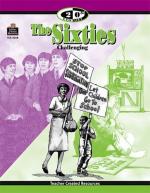|
This section contains 261 words (approx. 1 page at 300 words per page) |

|
Like the antiwar protesters, African American civil rights protests had started out peacefully. When Martin Luther King Jr. was met with police clubs and tear gas, he turned the other cheek, insisting that passive resistance would bring change. But just as the war protesters had become increasingly violent as their demands were ignored, by the late 1960s, many black people were tired of waiting for peaceful change, which was often promised but rarely delivered.
Black leaders such as Malcolm X began to advocate fighting back against white violence wherever it occurred. Malcolm X's words gave rise to the Black Power movement, whose members wanted equal rights immediately, and total black separation from white society.
After Malcolm X was murdered in 1965, other black voices joined in the chorus. Eldridge Cleaver, writing from prison, was not interested in sugar-coating the problems that existed for African Americans. He...
|
This section contains 261 words (approx. 1 page at 300 words per page) |

|




